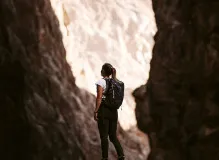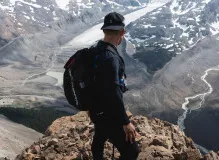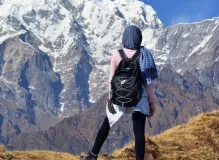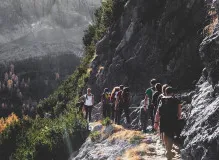For over long years, we have diligently conducted independent research and product testing. When you make a purchase through our links, we may earn a commission.
Discover the Amazing Benefits of Trekking - Boost Health, Fitness & Fun
Created: 1 hour ago
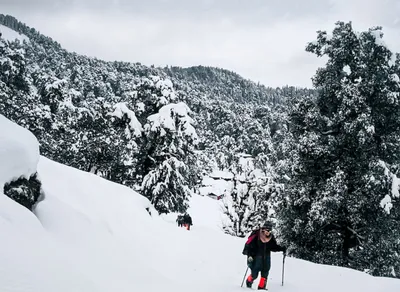
16 min Read
Introduction to Trekking: A Brief Overview of the Activity and Its Popularity
Trekking has gained immense popularity in recent years as more and more people seek adventurous experiences and a connection with nature. It is a thrilling outdoor activity that involves exploring and traversing through various terrains, such as mountains, forests, and valleys. Trekking offers numerous benefits, both physical and mental, making it an ideal choice for those seeking adventure and self-discovery.
Why is Trekking So Popular?
Trekking has become a trending activity for several reasons. Firstly, it offers a fantastic opportunity to disconnect from the bustling city life and immerse oneself in the tranquility of nature. With breathtaking landscapes and serene surroundings, trekking allows individuals to find solace and peace away from their daily routines.
Additionally, trekking is a great way to challenge oneself physically. It boosts cardiovascular health, strengthens muscles, and improves overall fitness levels. The varied terrain encountered during treks provides a natural workout, engaging different muscle groups and promoting endurance.
Apart from the physical benefits, trekking also has positive effects on mental well-being. Spending time in nature has been proven to reduce stress levels and boost mood. The fresh air, scenic views, and peaceful atmosphere all contribute to a sense of relaxation and rejuvenation. Trekking can also serve as a form of meditation, helping individuals regain focus and clarity.
Unveiling the Benefits of Trekking
-
Physical Fitness: Trekking involves walking long distances and navigating challenging terrains, which promotes physical strength and endurance. It is a great way to burn calories, boost metabolism, and strengthen muscles.
-
Mental Well-being: Trekking allows individuals to disconnect from technology and immerse themselves in nature. This break from the digital world helps reduce stress, anxiety, and depression, promoting overall mental well-being.
-
Improved Cardiovascular Health: Trekking involves regular aerobic exercise, which helps improve heart health and strengthen the cardiovascular system. The elevation gains during treks stimulate the heart and help maintain a healthy blood pressure level.
-
Connect with Nature: Trekking provides a unique opportunity to explore and appreciate the natural beauty of our planet. It allows individuals to connect with nature on a deeper level, fostering a sense of awe and gratitude.
-
Self-Discovery and Personal Growth: Trekking challenges individuals both physically and mentally, pushing them out of their comfort zones. This adventure-filled activity helps build resilience, boosts self-confidence, and encourages personal growth.
-
Social Bonding: Trekking can be a group activity, promoting social interaction, teamwork, and camaraderie. It provides an excellent opportunity to build lasting friendships and create cherished memories with like-minded individuals.
Conclusion
In conclusion, trekking is a highly popular outdoor activity that offers numerous physical and mental benefits. The opportunity to disconnect from technology, spend time in nature, and challenge oneself physically and mentally makes it an attractive choice for adventure enthusiasts. Whether you are seeking physical fitness, mental well-being, a deeper connection with nature, or personal growth, trekking can provide you with an enriching and unforgettable experience. So, grab your backpack, put on your sturdy shoes, and embark on an incredible trekking journey that will leave you with lasting memories and countless benefits.
Health Benefits of Trekking: How Hiking in Nature Can Improve Physical Well-being
Trekking, or hiking, is not only a thrilling adventure but also a fantastic way to improve your physical fitness. The benefits of trekking extend beyond the mental and emotional rewards, offering a wide range of health advantages. Let's explore how hiking in nature can positively impact your physical well-being.
1. Cardiovascular Health: Trekking involves continuous movement, which turns it into an excellent cardiovascular workout. As you walk uphill and navigate various terrains, your heart rate increases and stimulates blood circulation. This aerobic exercise strengthens your heart and lowers the risk of cardiovascular diseases.
2. Weight Management: Trekking is a calorie-burning activity that helps you maintain a healthy weight. Walking uphill and carrying a backpack can burn a significant number of calories while strengthening your leg muscles. It is a great way to shed extra pounds and tone your body.
3. Muscle Strength and Endurance: Hiking through uneven surfaces requires your leg muscles to work harder, promoting muscle strength and endurance. Uphill climbs engage your quadriceps, hamstrings, and calf muscles, while descending exercises your glutes and stabilizing muscles. The constant movement also improves overall muscle tone.
4. Improved Bone Density: The weight-bearing nature of trekking puts stress on your bones, stimulating them to become stronger and denser. Regular hiking can help prevent conditions like osteoporosis and improve bone health, especially in weight-bearing areas like the hips, spine, and legs.
5. Joint Health and Flexibility: Trekking involves continuous movement and different terrains that require balance and coordination. This helps to lubricate the joints, reduce stiffness, and increase flexibility. Regular treks can improve joint health and reduce the risk of age-related conditions like arthritis.
6. Enhanced Respiratory Function: The combination of fresh air and aerobic exercise during treks boosts lung capacity and improves respiratory function. With each deep breath, your lungs expand, increasing their efficiency and oxygen intake. This can benefit individuals with respiratory conditions such as asthma.
7. Reduced Risk of Chronic Diseases: Engaging in regular physical activity, such as trekking, lowers the risk of chronic diseases. It helps control blood pressure, manage cholesterol levels, and improve insulin sensitivity. These factors contribute to a reduced risk of heart disease, diabetes, and certain types of cancers.
In conclusion, trekking not only provides an opportunity to explore and connect with nature but also offers numerous physical health benefits. From cardiovascular fitness and weight management to improved muscle strength, joint health, and respiratory function, hiking in nature can enhance your overall well-being. So grab your hiking boots, prepare your backpack, and set off on an adventure that will benefit both your mind and body.
Fitness Advantages of Trekking: Enhancing Strength, Endurance, and Cardiovascular Health
Trekking offers a range of physical benefits, making it an excellent activity for enhancing fitness levels. By incorporating trekking into your routine, you can enjoy the advantages of improved strength, endurance, and cardiovascular health.
1. Building Strength:
Trekking involves traversing various terrains, such as steep inclines, rugged landscapes, and uneven paths. These challenges require the engagement of multiple muscle groups, leading to increased strength. Uphill climbs build lower body strength, especially in the calves, quads, and glutes. Carrying a backpack also adds resistance, further strengthening the core, back, and shoulders. As you tackle different obstacles along the trek, your body adapts and becomes more resilient, ultimately enhancing overall muscular strength.
2. Enhancing Endurance:
Endurance is a crucial aspect of trekking, as it involves walking long distances for extended periods. Engaging in regular trekking activities helps improve stamina and endurance levels. The varying terrains encountered during treks challenge the cardiovascular system, forcing it to work harder and adapt to the demands placed upon it. With time, your body becomes more efficient at oxygen intake and utilization, enabling you to trek for longer durations without feeling fatigued. This increase in endurance not only benefits your trekking adventures but also helps in everyday activities.
3. Boosting Cardiovascular Health:
Trekking is a form of cardiovascular exercise that promotes heart health. As you explore different trails, your heart rate increases, improving blood circulation throughout the body. This aerobic activity strengthens the heart muscle, improving its efficiency and reducing the risk of cardiovascular diseases. The elevation gains during treks also provide a natural cardiovascular challenge, helping to maintain healthy blood pressure levels. With regular trekking, you can enjoy a healthier heart and enhanced cardiovascular fitness.
In summary, trekking offers numerous fitness benefits, including increased strength, improved endurance, and better cardiovascular health. By incorporating trekking into your routine, you can enjoy the physical advantages that come with navigating through various terrains. So, put on your hiking boots, pack your essentials, and embark on an adventure that not only connects you with nature but also enhances your overall fitness levels.
Mental Benefits of Trekking: Reducing Stress, Improving Mood, and Enhancing Mental Clarity
Trekking not only offers physical fitness advantages but also provides numerous mental benefits. In today's fast-paced and stressful world, it is crucial to take time for oneself and prioritize mental well-being. Trekking in nature can be a powerful tool in achieving a rejuvenated mind and a positive outlook on life. Let's explore the mental benefits of trekking in detail:
Reducing Stress
One of the significant advantages of trekking is its ability to reduce stress levels. Spending time in nature has a calming and therapeutic effect on the mind. The serene environments, fresh air, and the rhythmic sound of footsteps create a soothing atmosphere, allowing individuals to unwind and relax. The peacefulness of nature helps to lower cortisol levels and reduce the impact of stress on both the mind and body.
Improving Mood
Trekking is like a natural mood booster. Engaging in physical activity and being surrounded by beautiful landscapes trigger the release of endorphins - the feel-good hormones. The combination of exercise-induced endorphins and the beauty of nature can have a tremendous impact on mood improvement. Stepping away from daily routines and immersing oneself in the wilderness helps in resetting the mind, promoting positive emotions, and alleviating symptoms of anxiety and depression.
Enhancing Mental Clarity
Another benefit of trekking is its ability to foster mental clarity and enhance focus. Being out in nature and away from the distractions of technology allows individuals to disconnect and reconnect with their thoughts. The peaceful surroundings and the absence of daily distractions create the perfect environment for introspection and self-reflection. Trekking provides an opportunity to declutter the mind, encouraging creativity, problem-solving, and enhanced mental clarity.
Boosting Self-confidence
Trekking is not only physically challenging but also mentally demanding. Successfully completing a trek, especially in challenging terrains, boosts one's self-confidence and self-esteem. Overcoming obstacles, accomplishing goals, and pushing personal limits during treks contribute to a sense of achievement and strengthen one's belief in their capabilities. This newfound confidence can transcend into other aspects of life, leading to personal growth and a more positive mindset.
Conclusion
Trekking provides a multitude of mental benefits. By reducing stress, improving mood, enhancing mental clarity, and boosting self-confidence, it offers a holistic approach to mental well-being. With its combination of physical activity, connection with nature, and personal challenges, trekking can be a transformative experience for individuals seeking a break from the demands of daily life. So, lace up your hiking boots, embark on an adventurous trek, and unlock the mental benefits that await you amidst the wilderness.
Social Benefits of Trekking: Building Stronger Connections and Creating Lifetime Memories
Trekking not only offers physical and mental benefits but also provides ample opportunities for social bonding and creating lasting memories. When embarking on a trekking adventure, individuals have the chance to connect with like-minded people, build new friendships, and foster a sense of camaraderie. Here are some of the social benefits that trekking brings:
-
Shared Experiences: Trekking often involves group activities, which allows individuals to share experiences and create bonds with fellow trekkers. These shared moments of overcoming challenges, marveling at nature's beauty, and conquering new heights create a strong sense of camaraderie amongst the group.
-
Teamwork and Collaboration: Trekking requires cooperation and teamwork, especially when navigating difficult terrains or facing unexpected obstacles. The need to rely on one another for support fosters teamwork and collaboration, strengthening the bonds between trekkers and promoting a sense of unity.
-
Building Lifelong Friendships: Trekking trips can bring together individuals from different backgrounds and cultures, providing a platform for building lifelong friendships. The shared adventure, the exhilaration of conquering new heights, and the bonds formed during the journey often lead to enduring friendships that extend beyond the trek itself.
-
Creating Lasting Memories: Trekking adventures are filled with memorable moments that stay with individuals for a lifetime. From scaling breathtaking summits to witnessing spectacular sunrises, these unique experiences become cherished memories that trekkers can reminisce about for years to come.
-
Cultural Exchange: Trekking in different regions and countries allows individuals to engage with local communities, learn about diverse cultures, and gain a deeper understanding of the world. This cultural exchange not only broadens personal perspectives but also fosters mutual respect and appreciation among trekkers and the local communities they encounter.
-
Support and Encouragement: Trekking in a group setting provides a platform for offering and receiving support and encouragement. During challenging moments, fellow trekkers can lend a helping hand, motivate each other to push through, and celebrate achievements together, creating a positive and uplifting environment.
In conclusion, trekking offers not only physical and mental benefits but also a range of social advantages. The opportunity to connect with like-minded individuals, build new friendships, and create lifelong memories makes trekking a truly enriching experience. So, gather your friends or join a trekking group, and embark on an adventure that will not only strengthen your body and mind but also create lasting bonds and cherished memories.
Tips for Safe and Enjoyable Trekking: Essential Preparations and Safety Measures
Trekking is an exhilarating activity that offers a myriad of benefits for those who embark on this adventure. However, before setting foot on the trail, it is essential to prepare thoroughly and prioritize safety to ensure a safe and enjoyable trekking experience. Here are some key tips to consider:
1. Plan Your Trekking Route and Duration
Before starting your trek, research and plan your route carefully. Consider factors such as the difficulty level, expected weather conditions, and the availability of food and water along the way. It is crucial to match the trekking route with your fitness level and experience to ensure a comfortable and enjoyable journey.
2. Check and Pack the Right Gear
Investing in quality trekking gear is essential for safety and comfort. Make sure to pack essential items such as a sturdy backpack, comfortable hiking boots, layered clothing, waterproof gear, sun protection, a first aid kit, a navigation device or map, and sufficient food and water. It's also essential to pack light to avoid unnecessary strain on your body.
3. Stay Hydrated and Nourished
Proper hydration and nutrition are paramount during trekking. Carry a sufficient amount of water and stay hydrated along the trail. Snacks high in energy, such as trail mix and granola bars, are essential to keep your energy levels up. Be mindful of carrying a balanced diet and maintaining regular eating intervals to fuel your body adequately.
4. Follow Safety Guidelines and Signs
Always adhere to safety guidelines and signs provided along the trail. These instructions are in place to ensure your safety and protect the natural environment. Pay attention to warnings regarding steep or slippery sections, potential wildlife encounters, or dangerous weather conditions. Following these guidelines will help prevent accidents and minimize risks.
5. Hike with a Group or Inform Others
Trekking with a companion or in a group is highly recommended, especially for beginners or unfamiliar routes. Hiking with others provides an extra layer of safety and support. Alternatively, if you choose to trek alone, inform a trusted person about your itinerary, expected duration, and emergency contact details. Regularly update them on your progress to ensure your well-being.
6. Respect Nature and Leave No Trace
When trekking, it is crucial to respect and appreciate the natural environment. Follow the principles of "Leave No Trace" by refraining from littering, damaging flora or fauna, or disturbing the local ecosystem. Being a responsible trekker helps preserve the environment for future generations to enjoy.
By following these essential tips, trekking enthusiasts can enjoy a safe and memorable experience amidst nature's wonders. Remember, thorough preparation, adherence to safety measures, and respect for the environment are the keys to a successful and fulfilling trekking adventure. So, lace-up your boots, embrace the challenge, and embark on an unforgettable journey through breathtaking landscapes and incredible experiences.
Unveiling the Benefits of Trekking
Trekking has become a hugely popular outdoor activity in recent years, and it's not hard to see why. With its combination of physical challenges, mental rejuvenation, and a deep connection with nature, trekking offers a wide range of benefits. Whether you're a seasoned hiker or new to the world of trekking, embracing this adventurous endeavor is sure to have a positive impact on your health, fitness, and overall well-being. Let's explore the various advantages that trekking has to offer.
Physical Fitness 💪
Trekking is an excellent way to improve your physical fitness. As you navigate through different terrains and walk long distances, it provides a fantastic cardiovascular workout. The uphill climbs and uneven surfaces engage various muscle groups, helping to strengthen your legs, core, and upper body. Not only does trekking burn calories and promote weight loss, but it also increases your endurance and stamina.
Mental Well-being 🧠
One of the biggest draws of trekking is the opportunity to disconnect from the fast-paced modern world and immerse yourself in nature's beauty. Spending time outdoors has been proven to reduce stress levels, alleviate anxiety and depression, and promote mental well-being. Trekking offers a chance to clear your mind, breathe in the fresh air, and escape the demands of everyday life. It can be a form of meditation that allows you to be present in the moment and appreciate the wonders of nature.
Improved Cardiovascular Health ❤️
Engaging in regular trekking not only benefits your overall fitness but also improves your cardiovascular health. The physical exertion involved in trekking increases your heart rate, helping to strengthen your heart and improve blood circulation. This cardiovascular workout helps reduce the risk of heart disease, lower blood pressure, and boost your overall cardiovascular endurance.
Connect with Nature 🌳
In our increasingly digital and urbanized world, trekking provides a unique opportunity to reconnect with nature. Surrounded by breathtaking landscapes, lush forests, and majestic mountains, you can truly appreciate the beauty and wonders of the natural world. Being in nature has a calming and grounding effect, allowing you to experience a sense of peace, tranquility, and awe.
Self-Discovery and Personal Growth 🌱
Trekking challenges you both physically and mentally, pushing you out of your comfort zone and encouraging personal growth. The rigorous demands of trekking require perseverance, determination, and resilience. Overcoming obstacles and reaching new heights fosters self-confidence and a sense of achievement. Trekking teaches you valuable life lessons, such as patience, adaptability, and the importance of setting and achieving goals.
Social Bonding 🤝
Trekking is often a shared experience, providing an excellent opportunity for social interaction, teamwork, and bonding. Embarking on a trek with like-minded individuals allows you to forge new friendships, create lasting memories, and support each other along the way. The shared challenges and triumphs of trekking can strengthen relationships and create a sense of camaraderie.
Incorporating trekking into your lifestyle can have a profound impact on your overall well-being. From physical fitness and mental rejuvenation to self-discovery and social bonding, the benefits are endless. So lace up your hiking boots, pack your backpack, and embark on an adventure that will not only challenge you but also transform you from the inside out. Embrace the power of trekking and unlock a world of health, fitness, and well-being.
Frequently Asked Questions (FAQs)
What is trekking?
Trekking is a form of outdoor adventure activity that involves hiking and walking long distances through natural landscapes, usually in mountainous or wilderness areas.
What are the health benefits of trekking?
Trekking offers numerous health benefits including improved cardiovascular fitness, stronger muscles, increased endurance, weight loss, stress reduction, and improved mental well-being.
Is trekking suitable for all fitness levels?
Trekking can be adapted to different fitness levels. There are treks of varying difficulty, ranging from easy walks to challenging climbs. It is important to choose a trek that matches your fitness level and abilities.
What should I pack for a trekking trip?
Essential items to pack for a trek include proper hiking boots, comfortable clothing, a backpack, a tent, sleeping bag, trekking poles, first aid kit, sufficient food and water, navigation tools, and appropriate weather gear.
How do I prepare for a trekking trip?
Preparing for a trekking trip involves building your fitness level through regular exercise, including cardio and strength training. It is also important to research the trek route, acclimatize to high altitudes if necessary, and pack the necessary gear and supplies.
Is trekking safe?
Trekking can be a safe activity if proper precautions are taken. It is important to choose a reputable trekking operator, follow safety guidelines, hike in a group, be aware of weather conditions, bring necessary safety equipment, and listen to the guidance of experienced guides.
Can trekking be done alone?
While trekking alone is possible, it is generally recommended to go with a group or hire a professional guide for safety reasons. Going with a group provides added support, enhances the overall experience, and reduces potential risks or emergencies.
Are there any age restrictions for trekking?
There are no strict age restrictions for trekking, as it depends on a person's fitness, health, and ability. However, most trekking operators have minimum age requirements, typically around 12-16 years old, and elderly individuals should consult a doctor before undertaking a strenuous trek.
Are there any environmental considerations when trekking?
Yes, it is important to practice responsible trekking by leaving no trace, disposing of waste properly, respecting wildlife and local cultures, staying on designated trails, and following any environmental guidelines or restrictions set by the trekking destination.
What are some popular trekking destinations?
Some popular trekking destinations include the Himalayas (Nepal, India, Bhutan), the Inca Trail (Peru), Kilimanjaro (Tanzania), the Appalachian Trail (USA), the Camino de Santiago (Spain), and the Great Wall (China). There are numerous other trekking destinations around the world offering unique landscapes and experiences.




